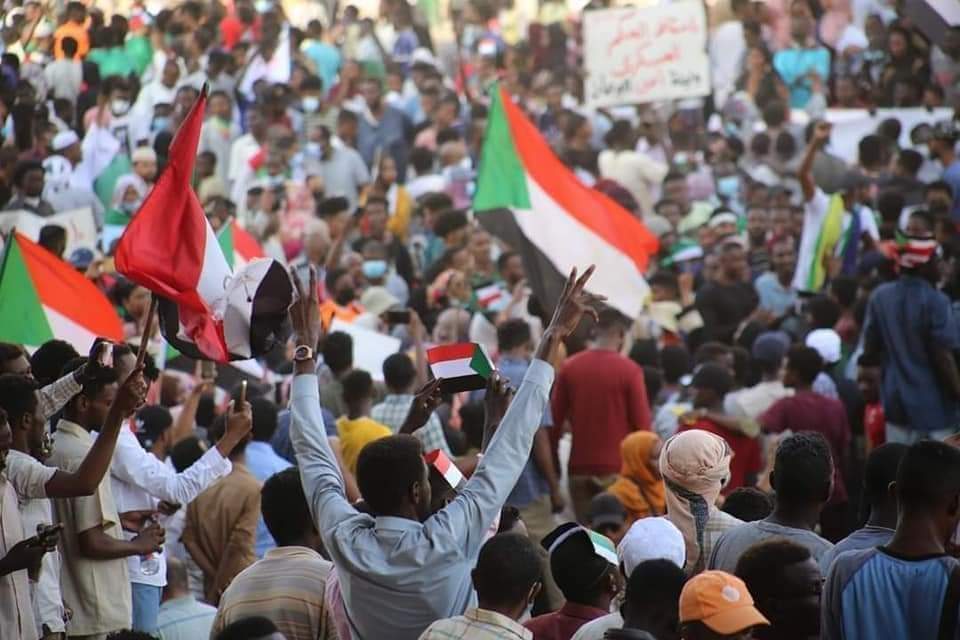
On 8 November RVI held a Forum ‘Understanding the Coup in Khartoum’ with speakers Kholood Khair, Eddie Thomas, Muez Ali, Sharath Srinivasan, Alden Young and Margie Buchanan-Smith. The following 5 points collates various comments made by the participants in the Forum. A podcast will be released in the next few days.
The removal of Bashir was made possible by a popular revolution, but it was engineered by a palace coup. Now it’s the coup-makers who are in charge.
While the revolutionaries on the Khartoum street were crucial in forcing Bashir’s departure in 2019, it was the military who eventually removed him. Sudan’s politico-economic system is based on a coalition of military/militia and business power, which has made the country’s Generals extremely powerful. While the military, and particularly General Abdel Fattah al-Burhan (de facto head of state), have made mistakes, they hold the keys to the palace and have the option of simply waiting for things to calm down. ‘The street’ is well-organised and motivated, but the Generals, however much they stumble, remain in-charge.
The military have made Hamdok popular again but renegotiating a deal with them will be a hard sell to ‘the street’.
Sudan’s (former) prime minster, Abdullah Hamdok, was given an extremely difficult, perhaps impossible job when he took over the role in 2019. He tried to follow a middle path: reaching out to the international community, particularly the International Financial Institutions (World Bank, IMF), in search of financial resources that would help him counter the economic muscle of the military. These partners required Hamdok to make the economic reforms that Bashir had attempted—including the removal of subsidies—but been unable to push through. In building up its international constituency Hamdok’s government neglected his civilian allies—the Forces for Freedom and Change (FFC)—and, more widely, ‘the street’, which has far more radical demands. Before Burhan’s coup, Hamdok was distinctly unpopular amongst ordinary Sudanese, but his arrest may have resurrected his reputation. However, making any deal with the military now, particularly one where Hamdok returns as PM, will prove very difficult to sell to his more sceptical allies.
Some of the rural rebels-cum-new political players have cast their bets on the side of the military system, despite having fought it for many years before.
The Juba Peace Agreement (JPA) was an innovative experiment in trying to breach the divide between rural and urban Sudan. It brought some of Sudan’s erstwhile rebels into government. But, instead of siding with the civilian government, the rebel leaders—Gibril Ibrahim of JEM and Minni Minawi of the SLM—have decided that the militarised system, represented by the army and the Rapid Support Forces (RSF), is a better bet to secure their own interests. The JPA itself, while ambitious and creative in its intentions, lacks the necessary financing to radically alter the current malaise of rural Sudan. The military’s deal-making with JEM and the SLM is an old-school form of Sudanese politics—a payroll peace that focuses on elites, rather than a plural political process.
Humanitarian needs are increasing in Sudan but aid flows into the country have stagnated.
After Bashir was removed, the new government of Sudan appealed to the international community to switch its assistance from humanitarian to development initiatives. The end of the dictatorship was supposed to be a new dawn, where security improved, thus allowing a different sort of international involvement in Sudan’s now supposedly post-conflict regions (particularly Darfur). However, despite the qualified successes of the JPA, there are extremely high humanitarian needs, particularly with respect to protection and the public health situation in light of the covid-19 pandemic. Thousands of people have been displaced in 2021 and UNOCHA has revealed that only 31 per cent of humanitarian needs have been funded.
The militia system is becoming more-and-more powerful, but radical decentralised democracy may be the thing to counter it.
The militia system—particularly the RSF—is now one of the most powerful forces in the country. Invented under Bashir, the militia enabled his government to carry on exploiting the peripheries (for oil, gold or agriculture) without providing any form of development reward. The RSF is now playing a role in rural Sudan akin to that of a political party: it is delivering healthcare and involving itself in agricultural production, as well as its interests in the extractive industries. This is helping it, and its leader Mohamed Daglo Hamdan ‘Hemedti’ to build a political base that the civilian leaders in urban Sudan have historically struggled to do. While the militia system now appears all-powerful, the radical decentralised democracy of the Resistance Committees, which grew out of the revolution, may offer a workable alternative approach. This is the hope for the future.
More from RVI on Sudan
Magdi el-Gizouli: Mobilization and Resistance in Sudan’s Uprising
Eddie Thomas and Magdi el-Gizouli: Sudan’s Grain Divide: A revolution of bread and sorghum



